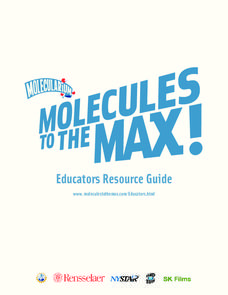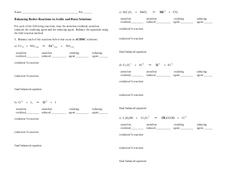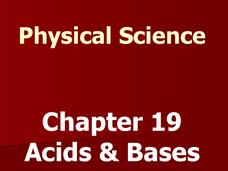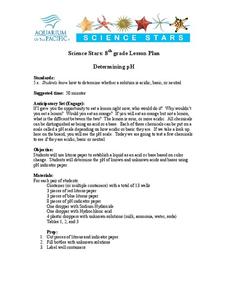Royal Society of Chemistry
Acids and Alkalis
Is your acid-base chemistry lesson plan a little ho-hum? Spice things up with puzzles! Young chemists manipulate facts about acids and bases to solve a series of interactive puzzles. The activity combines content knowledge and...
Royal Society of Chemistry
A Microscale Acid-Base Titration
Watch as acids and bases put smiles on their faces. Young chemists learn the concept of acid-base titration firsthand in a microscale experiment. Working groups collaborate, titrate, then use their data to determine the concentration of...
Rensselaer Polytechnic Institute
Molecules to the Max!—Educators Resource Guide
From molecules to nanotubes, an engaging unit explores the world of tiny science. Fifteen hands-on experiments and lessons engage young scientists as they learn chemistry. Discussions, worksheets, and data analysis reinforce the concepts...
LABScI
Acids and Bases: Cabbage Juice pH Indicator
Explore the range of pH using an assortment of household liquids. Scholars create their own pH indicators from cabbage and determine the pH of several liquids. To further their exploration, individuals use the same liquids to create...
Chymist
Tritration: Standardization of a Base and Analysis of Stomach Antacid Tablets
Do antacid tablets really do what they claim? An experimental lesson attempts to answer this question. Individuals practice the process of titration during the first part of the experiment. They then use those skills to neutralize an...
Teach Engineering
Basically Acidic Ink
If you don't want to drink red cabbage juice, here's another use for it—a decoder! Using vinegar and ammonia-based window cleaning liquids as invisible inks, scholars create designs in the second lesson of the series. Red cabbage juice...
National Institute of Open Schooling
Ionic Equilibrium
Scientific studies show the older we get, the more acidic we become. The activity extensively teaches high schoolers about acids and bases. By the end of the 14th installment of 36, they can define and explain three concepts of...
Teach Engineering
Red Cabbage Chemistry
Using the natural pH indicator of red cabbage juice, groups determine the pH of different everyday liquids. As they work, pupils gain an understanding of pH that may help deal with contaminants in the water supply.
Exploratorium
Indicating Electrolysis
Sure, your learners know water is made up of two molecules, but watching them separate helps the class see the construction like never before. This resource provides directions on how to build a simple electrolysis device using a...
Virginia Department of Education
Acid-Base Theory
Litmus paper, why so blue? A chemistry lesson includes a pre-lab activity, practice calculating pH, an experiment measuring the pH in acids and bases, a titration demonstration, and a titration experiment.
Virginia Department of Education
Acids and Bases
What did one titration say to the other titration? We should meet at the end point! Young chemists perform four experiments: dilute solution, neutralization, titration, and figuring pH/pOH.
Chymist
Visualizing pH
Why are acids and bases important in our daily lives? Lead the class in answering this question, among others, as they experiment with pH paper and classify where various substances belong on the pH scale. They also taste common acids...
Herff Jones Education
Acids, Bases, and Indicators—Colorful Chemistry
Lead the class in a colorful exploration of acids and bases as they learn to differentiate between the two. They identify common items considered acidic and basic, then explore their strengths and weaknesses. They titer solutions and...
University of Georgia
Antacid and Uncle Heartburn
Household materials can be used for more than cleaning! In this collaborative experiment, emerging chemists use products such as vinegar and liquid antacid to explore chemical reactions that commonly occur in the human body.
Curated OER
Balancing Redox Reactions in Acidic and Basic Solutions
Five acidic and five basic solutions are listed for your chemistry apprentices to review. For each, they must state which atom or ion is being oxidized or reduced, and then name the oxidizing or reducing agent. Finally, they balance each...
Teach Engineering
Basically Acids
Base your lesson plan on acids and bases on an informative resource. The first installment of a five-part module on the science behind Harry Potter has individuals investigate acid/base chemistry with the use of invisible inks. They also...
Mr. E. Science
Acids, Bases and Solutions
If you are not part of the solution, then you are part of the precipitate. The presentation covers solutions, suspensions, solubility, dissociation, and acid/base reactions. This is the 19th lesson in a series of 26.
Teach Engineering
Breathing Cells
Pairs work together to determine whether unknown solutions are either acids or bases by using a red cabbage indicator solution. After determining the general pH of the unknown solution, classmates blow into the same indicator after...
Curated OER
Chemical Reactions
In this chemical reactions worksheet, learners solve 16 exercises by writing and balancing chemical reactions. They calculate the concentration of various solutions.
Curated OER
Acids and Bases
In this acids and bases worksheet, students complete 32 fill in the blank and short answer questions on acidity or alkalinity. They color molecular diagram according to the key.
Curated OER
Acids and Bases
In this chemistry worksheet, students answer 50 multiple questions on acids and bases. They calculate the pH and pOH of acid and bases solutions.
Curated OER
Quiz on pH, Acids, Bases, Alkalis, Neutralisation and Salts
In this chemistry worksheet, students complete 5 multiple choice questions by selecting the correct answer from the drop down box.
Curated OER
Interdisciplinary Applications of Chemistry Through Engineering in Modern Medicine
Students explore the different techniques used in forensic science. In this chemistry activity, students investigate a fictional crime and identify the culprit. They create a brochure or collage career bulletin.
Curated OER
Determining pH
Eighth graders explain the difference between acids, bases and neutral solutions. In this chemistry lesson, 8th graders describe the properties of each. They determine the pH of an unknown solution using the indicator paper and pH scale.

























